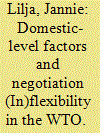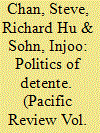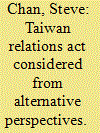|
|
|
Sort Order |
|
|
|
Items / Page
|
|
|
|
|
|
|
| Srl | Item |
| 1 |
ID:
113959


|
|
|
|
|
| Publication |
2012.
|
| Summary/Abstract |
Some suggest that the fault lines of the WTO's perceived failures actually lie in failures at the domestic level. This study examines the factors that can explain flexibility (and inflexibility) in multilateral trade negotiations within WTO member states. To shed light on the role of domestic factors in influencing WTO positions, we examine one member state in connection with a high-level meeting. India at the July 2008 Ministerial is selected primarily for methodological reasons. The empirical analysis provides preliminary support for the proposition that domestic policy-making structures marked by continuous information exchange and coordination are more likely to yield negotiation flexibility in multilateral talks. More specifically, the intense interaction that marks the relationships between actors involved in policy making on Non-Agricultural Market Access (NAMA) and services, where the Indian negotiation position was flexible overall, stands in contrast to what took place in the area of agriculture, where India took a manifestly inflexible stand. Competing explanations fail to fully account for the variation in these negotiating postures. A key insight from the analysis is that organized and regularized consultations, involving the same actors over time, are important. There is also a need for public outreach strategies in connection with high-level WTO meetings.
|
|
|
|
|
|
|
|
|
|
|
|
|
|
|
|
| 2 |
ID:
120212


|
|
|
|
|
| Publication |
2013.
|
| Summary/Abstract |
Why have relations across the Taiwan Strait and the 38th parallel on the Korean Peninsula undergone different processes of détente and reversal? We apply the perspective of two-level games to understand the divergent experiences of these two cases of contested sovereignty and regime rivalry. In particular, we call attention to the alignment and misalignment of domestic and international of interests and influences in our analysis, and the dampening and exacerbation of escalating recriminations in comparing these divergent experiences. Three phenomena are especially noteworthy. First, a third party, the US, is critical as a principal agenda setter. Washington's policies are important in abetting or hampering Seoul' and Taipei's domestic politics concerning policies toward their respective rivals. Second, Washington's policies are also important in influencing Beijing' and Pyongyang's policies, which in turn shape and even force responses from Seoul and Taipei. Therefore, policies tend to reverberate not just between domestic and foreign levels, but also across multiple borders in fostering cascades and echoes. Third, the extent to which political rapprochement is accompanied by economic integration is relevant. Extensive economic ties can serve as a brake to tension escalation, and produce resources and incentives that affect politicians' domestic competition and to alter their constituents' perceptions of the potential costs and benefits of pursuing détente and cooperation.
|
|
|
|
|
|
|
|
|
|
|
|
|
|
|
|
| 3 |
ID:
103095


|
|
|
| 4 |
ID:
110830


|
|
|
|
|
| Publication |
2012.
|
| Summary/Abstract |
According to two-level game theory, negotiators tailor agreements at the international level to be ratifiable at the domestic level. This did not happen in the Kyoto negotiations, however, in the US case. We interviewed 26 German, Norwegian, and US participants in and observers of the climate negotiations concerning their views on three explanations for why the United States did not become a party to Kyoto. Explanation 1 argues that Kyoto delegations mistakenly thought the Senate was bluffing when adopting Byrd-Hagel. Explanation 2 contends that Europeans preferred a more ambitious agreement without US participation to a less ambitious agreement with US participation. Finally, explanation 3 suggests that in Kyoto the Clinton-Gore administration gave up on Senate ratification, and essentially pushed for an agreement that would provide them a climate-friendly face. While all explanations received some support from interviewees, explanation 1 and (particularly) explanation 3 received considerably more support than explanation 2.
|
|
|
|
|
|
|
|
|
|
|
|
|
|
|
|
|
|
|
|
|